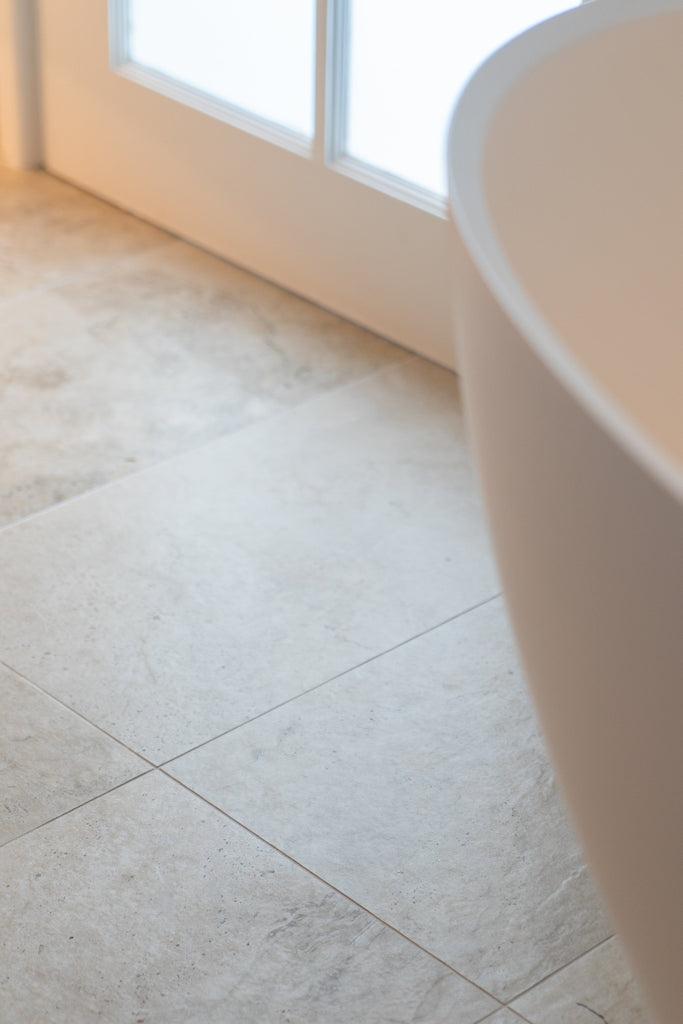How to Remove Grout Haze: 101
Just finished tiling your bathroom, kitchen or laundry? Congratulations! Before you call it finished, you’ll likely need to troubleshoot one last issue — that cloudy white film on the surface. The good news is grout haze is a common problem and easy to fix. This guide will show you how to quickly and effectively remove grout haze from your beautiful new tiles.

Byron Travertine Look Ivory Matte
What is grout haze?
Grout haze is the film that appears on your tiles after grouting. It happens when the grout mixes with water and dries on the tile surface. It might not seem like a big deal, but grout haze can dull the shine of your tiles, make them harder to clean and prevent proper sealing. Luckily, grout haze is usually easy to remove with proper cleaning, leaving you with sparkling clean tiles that look their best.
5 steps to clean grout haze
When it comes to grout haze, a little cleaning goes a long way, so gather your supplies and get cleaning!
You’ll need a:
- bucket;
- warm water;
- mild detergent;
- soft sponge or microfiber cloth;
- chemical-resistant gloves; and
- grout haze remover.
Whether you’re cleaning porcelain or ceramic tiles, the process to remove grout haze is the same. Here’s our five-step guide to getting your tiles looking fresh and clean:
- Prep the area: Sweep, vacuum or wipe the surface to remove any loose dirt or debris. This prevents them from scratching the tiles during cleaning.
- Wet the surface: Dampen your sponge or cloth with clean water and wipe down the entire tiled area. This helps loosen any surface haze and prepares the grout for the cleaning solution.
- Mix and apply: This process differs from case to case.
- For mild haze: Prepare a mix of mild detergent and warm water in your bucket. Dip your sponge or cloth into the solution, wring it out well and clean the tiles in small sections using circular motions.
- For tougher haze: Use grout haze remover to tackle tougher projects. Follow the manufacturer's instructions for mixing and application (this includes wearing chemical-resistant gloves!).
- Rinse and repeat: Rinse your sponge or cloth frequently in clean water to prevent spreading or redepositing the haze. Keep cleaning until all the grout haze is gone.
- Dry it off: Once the haze is gone, dry the cleaned area with a clean, soft cloth. Moisture left behind can create marks that can be just as unsightly as grout haze.
The best product to remove grout haze
For stubborn grout haze, we recommend Aqua Mix Cement Grout Haze Remover. This powerful yet gentle solution is specifically designed to remove grout haze after curing for at least 10 days. It also removes mineral deposits, rust stains, mortar smears and efflorescence. Remember, even with a specialist product, a gentle touch is important to avoid damaging your tiles.
Tips to minimise grout haze
Here's how to avoid the grout haze hassle in the first place:
- Follow the instructions: Grout manufacturers give instructions for a reason! Use the right amount of water and proper mixing techniques to significantly reduce grout haze.
- Clean as you go: While grouting, wipe away excess grout with a damp sponge regularly to prevent it from drying and forming haze. A proactive approach will save you time and effort in the cleaning stage.
- Choose the right tools: Using a quality grout float and sponge will ensure smooth application and minimal mess.
Sparkling grout, happy you!
With TileCloud, achieving a beautiful and grout-haze-free tiled space is easy. We offer tiles in various styles and colours for any decor style. Plus, we stock quality grout and grout remover, ensuring you have everything you need for a perfect finish.
Browse our extensive tile collection online or ask our friendly Sydney showroom staff for help in person. We're always happy to answer any questions you might have and help you find your dream tiles (and cleaning solutions!) for your project.
FAQs
How long to wait to wipe off grout haze
While you might be eager to see your finished project sparkling clean, patience is key! Ideally, wait at least 10 days for the grout to cure completely before cleaning the haze. This allows the grout to harden properly, ensuring a more effective cleaning process and reducing the risk of damaging the grout itself.
How to remove grout haze from ceramic tile
The good news is that the cleaning process for ceramic and porcelain tiles is the same! Follow the steps above using a mild detergent or grout haze remover. Remember to wear chemical-resistant gloves for protection and always test the cleaning solution in a small, inconspicuous area first to ensure it doesn't harm your tiles.
The best way to clean grout haze off porcelain tiles
Just like with ceramic tiles, porcelain tiles can be cleaned using soapy water or grout haze remover. Follow the steps outlined above. Although porcelain tiles are generally quite durable, it's still important to use a gentle touch and avoid harsh chemicals or abrasive scrubbing pads.

Mark Wilkinson is the co-founder of TileCloud and Yabby, two eCommerce businesses that are shaking up the renovation industry. He oversees finance, operations, and business administration, ensuring everything runs smoothly behind the scenes. Previously, he co-founded a commercial tiling business, which ultimately led to the start of TileCloud where he was a Project Director, managing procurement, contracts, and finance. Mark begun his career with roles in project management, services management and contracts administration, which gave him a solid foundation in the construction industry. Mark holds a Bachelor of Construction, Project Management from the University of Technology Sydney. With a passion for innovation and efficiency, he continually seeks ways to enhance his businesses and the industry.
